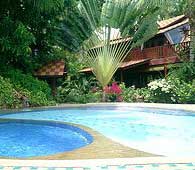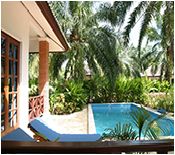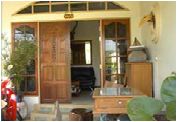Buying costs are now low
How high are realtors' and lawyers' fees in Thailand? What about other property purchase costs?
Transaction Costs |
||
| Who Pays? | ||
| Transfer Fee | 0.01% - 2.00% | buyer |
| Real Estate Agent's Fee | 3% - 5% | seller |
| Withholding Tax | 1% | seller |
| Stamp Duty | 0.50% | seller |
| Specific Business Tax | 3.30% | seller |
| Registration Fee | 2% | seller |
| Costs paid by buyer | 0.01% - 2.00% | |
| Costs paid by seller | 9.80% - 11.80% | |
| ROUNDTRIP TRANSACTION COSTS | 11.80% - 13.80% | |
| See Footnotes Source: Global Property Guide |
||
How difficult is the property purchase process in Thailand?
Foreigners cannot buy land in Thailand, only condominium units and apartments. Foreigners cannot make up more than 40% of the condominium's unit-owners. However, a foreigner can buy a whole building, minus the land on which it is built.
In recent years, minor changes in Thai law have allowed nonresidents to explore the Thai real estate market. A foreigner can have a 30-year renewable lease, under which the buyer registers at the Land Office an option to renew the lease contract indefinitely, for further 30-year periods.
 There are serious drawbacks, however. Lease renewals cannot be registered, and are not effective against a purchaser of the property. And the lessee cannot (without the lessor's consent) sublease, sell or transfer his or her interest.
There are serious drawbacks, however. Lease renewals cannot be registered, and are not effective against a purchaser of the property. And the lessee cannot (without the lessor's consent) sublease, sell or transfer his or her interest.
Another option is to set up a private limited company with mixed Thai and foreign ownership, the foreign ownership being 49% or less. Companies are allowed to own land. The foreign national can control the company by using a legal power of attorney from the Thai shareholders, handing control to the foreign directors, or through assigning greater voting rights to the foreigner partner/s. This is an effective and time-tested route, most commonly taken by foreigners. The help of a lawyer is very important.
Foreigners can also invest at least THB40 million (US$1,142,857) in a Board of Investment approved project. They will then be allowed to purchase up to 1 Rai (1,600 square meters) of land.
How to Form a Thai Private Limited Company
(provided by Somphob & Associates Law Office)
- Corporate Name Reservation. You must reserve a company name at the Register of Partnerships and Companies, Business Development Department, Ministry of Commerce; by submitting three prospective names. The company name must not be the same as that of any other registered company. The reservation is valid for 30 days with options for renewal. No fee is charged for this and you should expect to receive confirmation within two working days.
- File a Memorandum of Association. The Memorandum of Association must be filed with the Business Development Office. It should contain the reserved company name, location, objectives, registered capital, number of shares and par value (minimum of THB5 or US$0.16 each), pertinent information and signatures of the promoters (minimum of seven), and the number of shares subscribed by each promoter.
- Convene a Statutory Meeting. The list of subscribers, their addresses and number of shares must be presented at the Statutory Meeting. A Statutory Report or Notice of Invitation must be sent to each subscriber prior to the assembly for their information. Among other things, the agenda shall include:
- Adoption of articles of association
- Ratification of promoters' contracts and expenses
- Establishment of preference shares and their rights
- Fixing the number of shares to be fully or partially paid up
- Appointment of the directors and authorized director (You!)
- Appointment of auditors and agreeing on their remuneration
- Payment for shares. The directors should ensure payment of shares by subscribers, depending on the amount agreed upon during the Statutory Meeting.
- Registration. The company must be registered within three months after the Statutory Meeting by filing an application signed by the authorized directors. The application should be accompanied by the Statutory Meeting and approved Articles of Association. When the requirements have been satisfied and approved by the Registrar - usually after five working days - you will have to pay an official fee of THB50 (US$1) for every THB100,000 (US$2,857) of registered capital. The minimum is set at THB500 (US$16) and the maximum at THB25,000 (US$714). The certification document will be issued a day after the necessary payments have been settled.
- Tax Registration. A tax identification card and number must be obtained for the company from the Revenue Department. Companies earning more than THB600,000 (US$17,143) per year should also register for VAT.
Registration fees amount to about THB200 (US$6) for Affidavits and THB700 (US$20) for MoA and AoA. Lawyers would charge about US$2,000 + 7% VAT for company formation and additional US$200 for secretarial services (i.e. maintaining files, minutes and documents, etc.)
 Note that local banks do not provide loans to foreigners. It is also essential that all money be remitted from abroad in a foreign currency before conversion to Baht, clearly labeled: "For Purchase of a Condominium", and documented using an Exchange Control Form (Thor Tor 3), which can however only be issued to remittances exceeding US$5,000 (so be sure to manage the inflow of your finances well). Make sure, also, that the name on the Exchange Control Form is the same as the buyer's, to avoid delays and further inconvenience.
Note that local banks do not provide loans to foreigners. It is also essential that all money be remitted from abroad in a foreign currency before conversion to Baht, clearly labeled: "For Purchase of a Condominium", and documented using an Exchange Control Form (Thor Tor 3), which can however only be issued to remittances exceeding US$5,000 (so be sure to manage the inflow of your finances well). Make sure, also, that the name on the Exchange Control Form is the same as the buyer's, to avoid delays and further inconvenience.
Title Deeds
Titles are problematic in Thailand. It is important to distinguish between the different types and familiarize yourself with them before engaging in purchase transactions.
The best landed property titles are "Chanott ti din", i.e., title deeds with land accurately surveyed, giving incontestable possession of the land. The most developed areas of provinces have such titles. However most of Thailand does not, and even in Phuket, for example, only 10% of the land is under this title.
Most "titles" in the country are "Nor Sor Sam" or "Nor Sor Sam Kor", which are land title deeds in as much as clear records of ownership are maintained, and may be sold or leased, but tend to be less accurately surveyed than Chanott titles. If purchasing Nor Sor Sam-titled land lacking clearly defined physical boundaries, it is wise to ask the owner to stake out the boundaries, and then ask neighboring landowners to confirm his work.
Sor Kor Nung, Tor Bor Tor Hoc, and Tor Bor Tor Ha titles are essentially squatter's rights registered at the district office for a small fee. They cannot legally be sold, nor can the purchaser build on the land.
Finally, Sor Bor Kor are true title deeds, accurately surveyed and pegged (like a Chanott), which can be mortgaged and developed. But they cannot be leased, sold or transferred. So Sor Bor Kor must be ignored.
Aside from landed titles, there are condominium titles. Established under the condominium act of 1979, this is a title to a part of a building or buildings with multiple owners, and a fractional interest in the land (always a Chanott) and other common assets (such as a swimming pool) and common parts of the building (such as the stair well or lobby). The title will state the floor area of the private apartment, the ground area of the common land and the percentage interest which that apartment has in the common property. This percentage also represents the value of the voting interest in the condominium company or owners' association.
Buying Process
It is very important to hire a real estate attorney when purchasing property. The realty industry in the country is still unregulated, so a lawyer will be able to provide more security than a mere real estate agent.
There are, essentially, two important documents that are needed: passport and an Exchange Control Form. But if the option of buying through a company is preferred, the following are required documents:
- Certified copy of the certificate of incorporation
- Certified copy of the memorandum of association
- Notaries certificate
- List of shareholders (in English with Thai translation)
- Minutes of directors' meetings with resolution to purchase the property
- Letter of advice regarding specific signature
- Power of attorney - if you, as a director, will not be present in the transactions
- Free debt letter
- Foreign co-owner letter
- Certified copy of IDs of authorized director(s)
- Certified copy of the house registration of the authorized director(s)
- Title deed of the condominium unit
 Due diligence should be conducted prior to signing agreements and paying deposits. It is wise to ask the lawyer to do a caveat search and verify the property's actual condition before engaging in purchase transactions. Once the seller accepts the offer, his lawyer will prepare a purchase agreement. This should include, among other things, which party pays the legal fees, transfer fees, and taxes.
Due diligence should be conducted prior to signing agreements and paying deposits. It is wise to ask the lawyer to do a caveat search and verify the property's actual condition before engaging in purchase transactions. Once the seller accepts the offer, his lawyer will prepare a purchase agreement. This should include, among other things, which party pays the legal fees, transfer fees, and taxes.
A deposit of 10% will be paid upon signing. Bear in mind: Deposits in escrow are still rare. Furthermore, deposits are non-refundable unless it is the seller who backs out. In that case, he will need to pay you double the amount for damages.
Closing usually takes 30 to 60 days. This includes the exchange of contracts and settlement of the remaining balance. When these have been accomplished, the title deeds will be submitted to the Land Department for registration and payment of government duties.
Footnotes to Transaction Costs Table
The round trip transaction costs include all costs of buying and then re-selling a property - lawyers' fees, notaries' fees, registration fees, taxes, agents' fees, etc.
Transfer Fee
Transfer fee is levied at a flat rate of 2%.
From 02 November 2019 to 24 December 2020, the transfer fee has been reduced to 01% for property valued at THB3,000,000 (US$85,714).

 Real Estate Agent's Fee:
Real Estate Agent's Fee:
Real estate agent's fee is around 3% to 5% of the property value. It is typically paid by the seller.

 Withholding Tax:
Withholding Tax:
A withholding tax is levied at 1% of the declared amount or the assessed value of the property, whichever is higher.

 Stamp Duty:
Stamp Duty:
Stamp duty is 0.50% of the declared amount or the assessed value of the property, whichever is higher.
Registration Fee
Registration fee is around 2% of the declared amount or the assessed value of the property, whichever is higher.

 Specific Business Tax:
Specific Business Tax:
The Special (or Specific) Business Tax is levied at around 3.30% of the property value. It is imposed on sale of immovable properties in lieu of VAT. Municipal Tax, at 10% of Special Business Tax, is added.
Legal Fee
Legal fees are negotiable.